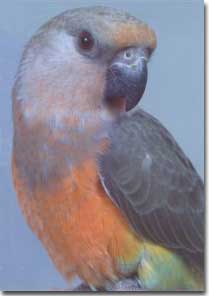
Poicephalus parrots are shy, quiet parrots from Africa. Their members include Red Bellied parrots, Jardine's parrots, Senegal parrots, Meyers parrots, Silver Headed parrots and Brown Necked parrots (the latter two have been formally known as Cape parrots). We raise thus far only the Red Bellied parrots and the Jardine's parrots; we will be breeding both Silver Headed and Brown Necked in the future, and perhaps Meyers.
Poicephalus parrots are playful and outgoing. When in a comfortable situation, they love to play and roll around. They also like to be cuddled. They can learn to talk well. They also learn strange sounds like the microwave beep and the telephone ring. One year we had one of our people get a cough that lasted more than a month. All our Poicephalus parrots learned the human cough sound and used to greet him in the morning with much coughing. Smaller, quiet birds, they are great for apartments.
Poicephalus parrots are not strong gripping birds; they don't clutch really hard with strong feet. Consequently, especially when young, they do better if they have perches that are a bit rough, such as natural branches with good rough bark or sandblasted manzanita, as opposed to slick-barked manzanita.
Jardine's parrots and Red Bellied parrots each have an extremely shy side. In fact, as they are growing up, they go through a profound fear stage that will cause them to flip from "bold" to "terrified" in the blink of an eye. Once through this initial stage (lasting a few weeks) this fear behavior can return briefly, suddenly, unexpectedly whenever the bird feels overwhelmed. This is probably some kind of survival mechanism; they must have many stealthy predators that think these birds are extremely tasty in the wild. When they are frightened they can bite very hard.
Providing easily-gripped surfaces will increase a Poicephalus parrot's confidence and reduce the fear of falling. Minimal flight feather clipping also helps them feel secure; if they drop like rocks they can frighten themselves and potentially hurt themselves as well. Fearful experiences like this stay with Poicephalus parrots for their lifetimes.
Fortunately, if they are raised properly so that they experience the world as a safe place, learning to fly and land with skill, this fear can be minimized. Once grown up, if they live in quiet, peaceful circumstances with few scary surprises, this behavior seldom surfaces.